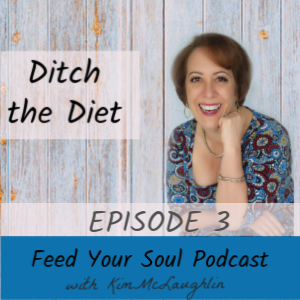This is a portion of the transcript of from Episode #3: from my Podcast: Feed Your Soul with Kim.
Often our focus on dieting happens twice a year: at the New Year and just prior to the summer. At New Year, the focus is on losing weight and getting to your goal weight during the year, because there is this idea that you cannot be ok with your current size. In the summer, the advertisements focus on having that “bikini body,” wearing short shorts, and tank tops. Along with these advertisements about swimsuits, there’s the underlying message that you need to reach a certain number on the scale or that you need to follow a certain diet in order to be that size in order to be “bikini ready.”
The imagery connected with dieting is:
- Happy people are thin people.
- Sad people are overweight people
This creates a diet mindset that we have all bought into.
How is this a diet mindset?
- Our thoughts tell us we need to be a certain size.
- Society teaches us to have a lack of acceptance of our bodies.
- This is a “scale-driven” mindset where we are only satisfied with a certain number on the scale.
We have bought into this diet mindset because we were indoctrinated into it. Diets failed you. you didn’t fail.
Keeping the diet mindset going is the strategy of the 2 billion dollar weight loss industry, which includes books, programs, diet food, diet drugs and weight loss surgery. They do this to make money! If diets worked over the long term then we would not need to keep talking about it. The failure rate of diets is 80-90% long term. That is the failure rate! So, that means the success rate long term is 10-20%.
There are many reasons why diets don’t work.
Truthfully, diets don’t work, because they focus on deprivation.
You are required (in order to be successful) to eat only certain foods on their list in whatever combinations they tell you and don’t eat any other food. There are forbidden foods that you just aren’t supposed to eat. We know that when we are told there are forbidden foods, we want them even more. You feel like you can’t control yourself.
It is the deprivation that sets us up to what we can’t have, which then sets us up for binging, guilt and more dieting.
In reality, diets make us focus on food all the time.
When are on a diet we are told to look at food 24 hours a day. This makes us think about food all of the time. When you think about it that much, you want it more. What we really want to do is to put food in its proper place as nourishment and look at it as we’re hungry and intuitively determine what we really need.
Really, diets lead us to think of food in terms of good foods vs fad foods.
I think there is no Good food and no Bad food. Food is food. There is food that gives us energy and food that takes energy away. There is food that makes our body feel good and there is food that doesn’t.
Truthfully, we tend to want what we think are “bad” food, especially when emotions come up. It is so common to hear people state they ate “bad’ food and now they need some kind of punishment (generally exercise or a diet). When we feel upset we generally tend to go towards foods many people would consider “bad”: sweet food, salty food, fatty food, etc. Good food, on the other hand is generally low in fat, low in sugar, and sounds boring and is diet-related.
In order to ditch the diet, you need a plan if action.
Here are three strategies to help end the dieting mindset.
- I suggest you ask yourself this question and journal, “What is dieting to me?” The answer is really individual. For me, dieting is constant hunger, deprivation, and foods are off limits. This is the type of deprivation that leads to rebellion, which leads to overeating at some point. Diets can be the surprise is healthy eating. Ask yourself, do I feel deprived? Do I feel restricted? Does this eating plan lead me to think constantly about food? This is that diet- binge- guilt cycle that comes when we engage in more and more dieting. Let go of the guilt about eating, your weight and the scale.
- Are you focused on your weight? Weighing yourself or multiple times a day really leads you into that diet mindset. I recommend you let go of the focus on your weight and let go of the scale. Connect back to your body and self-love.
- Eat intuitively connect with your body and mindfulness. Focus on physical hunger: this real hunger is the hunger we want to base our eating on.
I encourage you to look back on your history of dieting and notice the patterns.
How does it feel to see your history of dieting and how diets have failed you? This doable is a start in the direction of peace with food.
Kim McLaughlin, MA is a Counselor, Speaker, and Inspirational Coach who specializes in working with people who suffer from binge eating,overeating, emotional eating and over dieting. She is a Certified Intuitive Eating Counselor. She is the author of the newly released book Feed Your Soul Nourish Your Life! A Six Step System to Peace with Food and the Amazon #1 Best Selling book Discovery Your Inspiration.
She has recently launched her podcast Feed Your Soul with Kim. You can find it on all podcast platforms including ITunes.
Kim McLaughlin has been identified as writing one of the Top 50 Blogs about Emotional Eating by the Institute on Emotional Eating. Sign up for her free Special Report: Top Strategies to End Emotional Eating here or visit her website at www.FeedYourSoulUnlimited.com.




